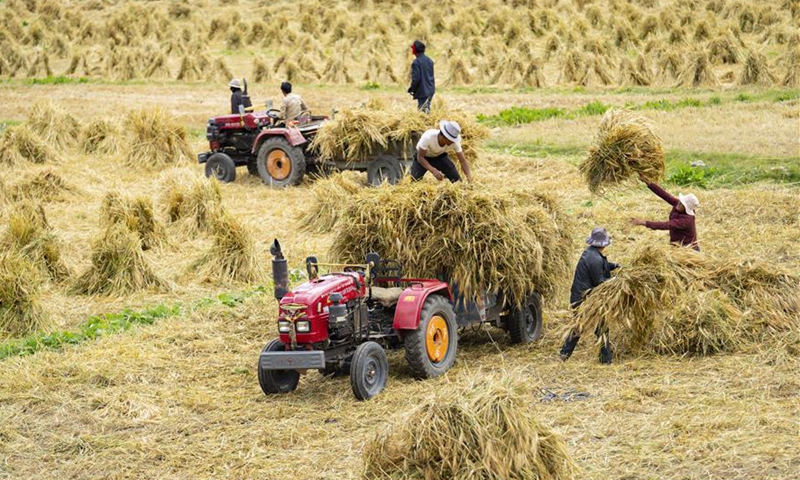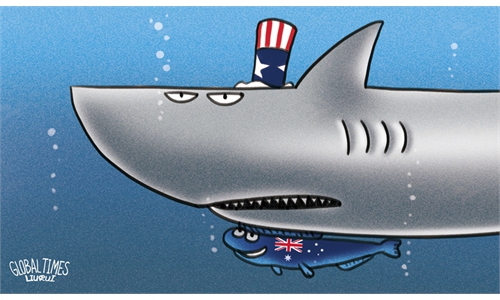Data shows Australian barley exports to China were dumped; experts say Australia to lose WTO case

Farmers harvest highland barley in Kangsar Village, Qamdo City of southwest China's Tibet Autonomous Region, Sept. 10, 2020. Photo:Xinhua
Statistics showed that Australian barley exported to China has shown obvious dumping signs in recent years, which will lead to Canberra's loss in its appeal against Beijing at the World Trade Organization, experts said, after Australia announced plans to challenge China over tariffs on its barley.
An investigation report found when China increased barley imports from Australia by 67 percent in terms of volume from 2014 to 2017, the import price sank 26.54 percent during the same period.
"These are obvious signs of dumping," He Weiwen, an executive council member of the China Society for World Trade Organization Studies, told the Global Times on Wednesday, adding there is an 80-percent chance for Australia to lose the case against China.
According to an investigation by the China Chamber of International Commerce, China's import volume of Australian barley soared from 3.88 million tons in 2014 to 4.18 million tons in 2018, but the price sank from 2.11 yuan ($0.32) per kilogram to 1.83 yuan during the period. In 2017, when imports peaked at 6.48 million tons, the price of Australian barley sold to China fell to 1.55 yuan per kilogram.
It is noted that Australia holds about 50 percent of the barley market in China.
Under the pressure of Australia's dumping and subsidies for barley, the China Chamber of International Commerce said China's barley industry suffered serious losses.
The planting area of barley in China dropped 12.61 percent from 2014 to 2018, with the domestic barley yield plunging 5.63 percent and the market share of China-grown barley decreasing by 5.02 percentage points.
To compete with cheap Australian barley, the Chinese barley price dropped from 2.14 yuan per kilogram to 1.97 yuan per kilogram— a 7.94 percent decrease — which led to 58.08 percent increase in losses.
The dumped and subsidized imports greatly dampened Chinese farmers' enthusiasm to grow barley, and had a negative impact on Chinese farmers' income and rural development, the chamber said.
Xu Rugen, executive director of the beer and barley association in East China's Jiangsu Province and chairman of Shanghai-based Tianxiang, said that Australian's barley exports to China have taken away the pricing power of domestic barley growers.
According to him, farmers in China lost interest in growing barley as a large influx of Australian barley forced domestic prices to fall. The barley-growing area in Jiangsu Province declined to 1 million mu (66,666 hectares) from more than 3 million mu in the past few years, he noted.
As a result, China in May imposed five years of anti-dumping and anti-subsidy duties totaling 80.5 percent on Australia's barley.
Responding to Australia's WTO appeal, Wang Wenbin, a Chinese Foreign Ministry spokesman, on Wednesday told a regular briefing that the Australian government should take China's concerns seriously, and take concrete action to correct its discriminatory practices against Chinese companies.
"It is not difficult to provide evidence that Chinese firms suffered from the losses caused by Australian products, which are sold at below-cost prices. The power of interpretation of how Chinese firms suffered the losses lies in China's hand. With the evidence, China will win the lawsuit," said Huo Jianguo, vice chairman of the China Society for World Trade Organization Studies.
Calling the China-imposed tariffs "reasonable," Zhou Rong, a senior research fellow at the Chongyang Institute for Financial Studies at the Renmin University of China, told the Global Times that Australia is unable to make up for the loss of exports to China if it relies on domestic demand due to the small population base in the country.
"Besides, as Joe Biden is going to take office in the US, it is hard to tell whether Australia will win support from the US if it keeps discriminating China, such as banning Huawei's 5G," Zhou warned.



